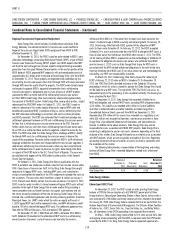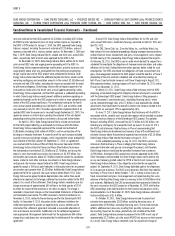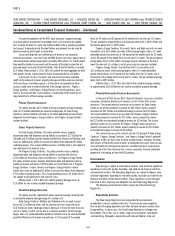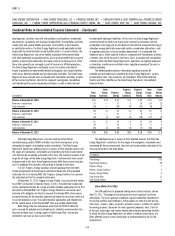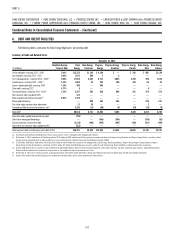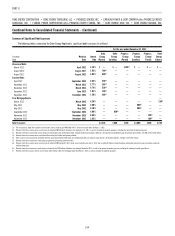Duke Energy 2012 Annual Report Download - page 167
Download and view the complete annual report
Please find page 167 of the 2012 Duke Energy annual report below. You can navigate through the pages in the report by either clicking on the pages listed below, or by using the keyword search tool below to find specific information within the annual report.
147
PART II
Combined Notes to Consolidated Financial Statements – (Continued)
DUKE ENERGY CORPORATION • DUKE ENERGY CAROLINAS, LLC • PROGRESS ENERGY, INC. • CAROLINA POWER & LIGHT COMPANY d/b/a PROGRESS ENERGY
CAROLINAS, INC. • FLORIDA POWER CORPORATION d/b/a PROGRESS ENERY FLORIDA, INC. • DUKE ENERGY OHIO, INC. • DUKE ENERGY INDIANA, INC.
fee assessments imposed under two new resolutions promulgated by the
Brazilian Electricity Regulatory Agency (ANEEL) (collectively, the Resolutions).
The Resolutions purport to impose additional transmission fees (retroactive to
July 1, 2004 and effective through June 30, 2009) on generation companies
located in the State of São Paulo for utilization of the electric transmission
system. The new charges are based upon a fl at-fee that fails to take into
account the locational usage by each generator. DEIGP’s additional assessment
under these Resolutions amounts to approximately $61 milli on, inclusive of
interest, through December 2012. Based on DEIGP’s continuing refusal to tender
payment of the disputed sums, on April 1, 2009, ANEEL imposed an additional
fi ne against DEIGP in the current amount of $9 million. DEIGP fi led a request
to enjoin payment of the fi ne and for an expedited decision on the merits or,
alternatively, an order requiring that all disputed sums be deposited in the
court’s registry in lieu of direct payment to the distribution companies.
On June 30, 2009, the court issued a ruling in which it granted DEIGP’s
request for injunction regarding the additional fi ne, but denied DEIGP’s request
for an expedited decision on the original assessment or payment into the court
registry. Under the court’s order, DEIGP was required to make installment
payments on the original assessment directly to the distribution companies
pending resolution on the merits. DEIGP fi led an appeal and on August 28, 2009,
the order was modifi ed to allow DEIGP to deposit the disputed portion of each
installment, which was most of the assessed amount, into an escrow account
pending resolution on the merits. Duke Energy has made deposits to escrow of
$33 million associated with this matter.
Brazil Expansion Lawsuit.
On August 9, 2011, the State of São Paulo fi led a lawsuit in Brazilian
state court against DEIGP based upon a claim that DEIGP is under a continuing
obligation to expand installed generation capacity by 15 percent pursuant to
a stock purchase agreement under which DEIGP purchased generation assets
from the state. On August 10, 2011, a judge granted an ex parte injunction
ordering DEIGP to present a detailed expansion plan in satisfaction of the 15 percent
obligation. DEIGP has previously taken a position that the 15 percent expansion
obligation is no longer viable given the changes that have occurred in the electric
energy sector since privatization of that sector. After fi ling various objections,
defenses and appeals regarding the referenced order, DEIGP submitted its proposed
expansion plan on November 11, 2011, but reserved its objections regarding
enforceability. The parties will in due course present evidence to the court regarding
their respective positions. No trial date has been set.
Crescent Litigation.
On September 3, 2010, the Crescent Resources Litigation Trust fi led
suit against Duke Energy along with various affi liates and several individuals,
including current and former employees of Duke Energy, in the U.S. Bankruptcy
Court for the Western District of Texas. The Crescent Resources Litigation Trust
was established in May 2010 pursuant to the plan of reorganization approved
in the Crescent bankruptcy proceedings in the same court. The complaint
alleges that in 2006 the defendants caused Crescent to borrow approximately
$1.2 billion from a consortium of banks and immediately thereafter distribute
most of the loan proceeds to Crescent’s parent company without benefi t to
Crescent. The complaint further alleges that Crescent was rendered insolvent by
the transactions, and that the distribution is subject to recovery by the Crescent
bankruptcy estate as an alleged fraudulent transfer. The plaintiff requests
return of the funds as well as other statutory and equitable relief, punitive
damages and attorneys’ fees. Duke Energy and its affi liated defendants believe
that the referenced 2006 transactions were legitimate and did not violate any
state or federal law. Defendants fi led a motion to dismiss in December 2010.
On March 21, 2011, the plaintiff fi led a response to the defendant’s motion
to dismiss and a motion for leave to fi le an amended complaint, which was
granted. The Defendants fi led a second motion to dismiss in response to
plaintiffs’ amended complaint.
The plaintiffs fi led a demand for a jury trial, a motion to transfer the
case to the federal district court, and a motion to consolidate the case with
a separate action fi led by the plaintiffs against Duke Energy’s legal counsel.
On March 22, 2012, the federal District Court issued an order denying the
defendant’s motion to dismiss and granting the plaintiffs’ motions for transfer
and consolidation. The court has not yet made a fi nal ruling on whether
the plaintiffs are entitled to a jury trial. Trial on this matter has been set to
commence in January 2014. Mediation, held on August 21 and 22, 2012, was
unsuccessful. It is not possible to predict whether Duke Energy will incur any
liability or to estimate the damages, if any, that Duke Energy might incur in
connection with this lawsuit. The ultimate resolution of this matter could have a
material effect on the consolidated results of operations, cash fl ows or fi nancial
position of Duke Energy.
Federal Advanced Clean Coal Tax Credits.
Duke Energy Carolinas has been awarded $125 million of federal
advanced clean coal tax credits associated with its construction of Cliffside Unit 6
and Duke Energy Indiana has been awarded $134 million of federal advanced
clean coal tax credits associated with its construction of the Edwardsport IGCC
plant. In March 2008, two environmental groups, Appalachian Voices and the
Canary Coalition, fi led suit against the Federal government in the United States
District Court for the District of Columbia challenging the tax credits awarded to
incentivize certain clean coal projects. Although Duke Energy was not a party to
the case, the allegations center on the tax incentives provided for the Cliffside
and Edwardsport projects. The initial complaint alleged a failure to comply
with the National Environmental Policy Act. The fi rst amended complaint, fi led
in August 2008, added an Endangered Species Act claim and also sought
declaratory and injunctive relief against the DOE and the U.S. Department of
the Treasury. In 2008, the District Court dismissed the case. On September 23,
2009, the District Court issued an order granting plaintiffs’ motion to amend
their complaint and denying, as moot, the motion for reconsideration. Plaintiffs
have fi led their second amended complaint. The Federal government has moved
to dismiss the second amended complaint; the motion is pending. On July 26,
2010, the District Court denied plaintiffs’ motion for preliminary injunction
seeking to halt the issuance of the tax credits.
Duke Energy Carolinas
New Source Review (NSR).
In 1999-2000, the U.S. Department of Justice (DOJ), acting on behalf
of the EPA and joined by various citizen groups and states, fi led a number
of complaints and notices of violation against multiple utilities across the
country for alleged violations of the NSR provisions of the CAA. Generally, the
government alleges that projects performed at various coal-fi red units were
major modifi cations, as defi ned in the CAA, and that the utilities violated
the CAA when they undertook those projects without obtaining permits and
installing the best available emission controls for SO2, NOx and particulate
matter. The complaints seek injunctive relief to require installation of pollution
control technology on various generating units that allegedly violated the CAA,



